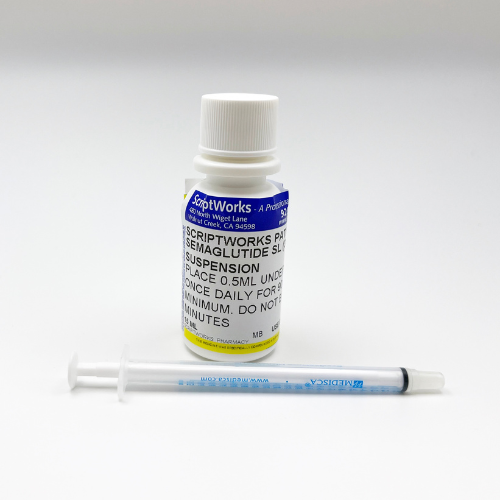Table of Contents

Author: Bob Brensel | President, Pharmacist | ScriptWorks
Bob Brensel, RPh, earned his Pharmacy Degree at University of the Pacific in Stockton, California in 1980. Former California Pharmacists Association’s Award Winner for Recognition of Outstanding Achievement in Compounding Pharmacy. Read More →
GLP-1 continues to gain attention as a medication along the ongoing journey to find weight management solutions.
As part of a medication class called GLP-1 receptor agonists (Glucagon-like peptide-1), GLP-1 mimics the natural GLP-1 hormone, which is released in the digestive tract after eating. Originally developed to address type 2 diabetes, GLP-1 has demonstrated potential benefits beyond blood sugar regulation.
GLP-1 analogues offer a multi-faceted approach to managing diabetes and supporting weight loss. They slow gastric emptying, help regulate appetite through brain signaling, and enhance insulin secretion. Research has also linked these medications to reduced risks of chronic conditions such as heart disease, diabetes, and certain cancers in overweight individuals.
GLP-1 for Weight Loss: A Growing Trend
Although GLP-1 is FDA-approved for weight management only under the brand Wegovy™, growing interest in its weight loss potential has led many healthcare providers to prescribe it off-label.
Due to the surge in demand, there have been shortages that affect patients who depend on the drug for diabetes management.
Weight Loss Outcomes in Non-Diabetic Patients
While various medications exist for weight loss, GLP-1 receptor agonists appear to outperform older options. The Clinical Trial Series demonstrated significant results. For example, participants in the STEP 1 trial achieved an average 15% reduction in body weight over 68 weeks. Those in the STEP 4 trial, who had both obesity and type 2 diabetes, saw not only weight loss but also improved blood glucose levels.
Further evidence, including research published in the New England Journal of Medicine, indicates that GLP-1 may positively impact cardiovascular health in obese individuals.
Side Effects and Considerations
Common side effects of GLP-1 are generally mild and manageable, especially compared to the long-term risks associated with obesity. These may include dizziness, fatigue, headaches, and gastrointestinal discomfort (bloating, constipation, diarrhea).
GI-related symptoms are the most frequently reported but may be minimized by starting with a lower dose and gradually increasing it. Patients with a history of thyroid cancer or pancreatitis should consult with their healthcare provider before starting a GLP-1 medication.
GLP-1 should be considered a supportive tool — not a complete therapy. Combining it with healthy eating, physical activity, and lifestyle changes may lead to more sustainable, long-term success in weight management.
Custom Compounded GLP-1 Available at ScriptWorks
For patients and providers in California, ScriptWorks offers compounded sublingual GLP-1 formulations. As a leading compounding pharmacy based in the East Bay, ScriptWorks collaborates with healthcare providers across the state to deliver tailored therapies that support better patient outcomes.
California Providers
Simplify your prescribing process using our GLP-1 Rx Order Form — choose from tailored options designed to meet each patient’s needs.
California Prescribers
GLP-1 Rx Order Form
We make it easy to prescribe GLP-1 for your patients through our GLP-1 Rx Order Form. Simply select from our recommended options for each patient.
Discover more about our
customized GLP-1 formulas and provider resources >>




